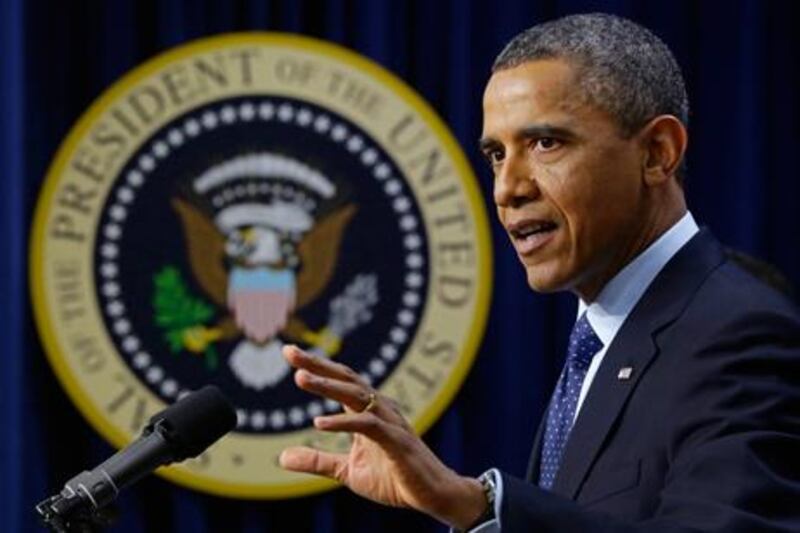WASHINGTON // The White House and top Republicans struck a deal late last night to avert huge New Year tax hikes and spending cuts known as the "fiscal cliff" that had threatened to send the US economy into recession.
The pact, if agreed by Congress, would hand President Barack Obama a victory by hiking tax rates on the wealthy -- those earning over $450,000 a year -- but exempt everyone else who had been due to see their taxes go up on January 1.
It would also put off $109 billion in budget cuts across the government for two months, but would in the process line up another showdown between President Obama's Democrats and Republicans in dysfunctional Washington at the end of February.
Vice President Joe Biden, who negotiated the deal with the top Republican in the Senate Mitch McConnell, was on Capitol Hill to sell it to Democratic senators, some of whom wanted tax hikes to kick in at a lower threshold.
Had no deal been struck, budget experts warned that the fragile US economy could have been sent spinning back into recession by the $500 billion combined whack from spending cuts and tax hikes.
In the end, the deal was clinched just a few hours before a midnight deadline. A Senate vote was possible overnight, while the House of Representatives was not due back into session until today.
World stock markets, expected to be thrown into turmoil by a failure to beat the deadline, are closed for New Year's Day, so lawmakers have a few extra hours of breathing room to get the deal concluded.
The deal means a return to Bill Clinton-era tax rates for top earners to 39.6 per cent, starting for those who make $450,000 a year and above.
President Obama had originally campaigned for tax hikes to kick in for those making $250,000 and above.
The president said earlier that the deal would extend tax credits for clean energy firms and also unemployment insurance for two million people that had been due to expire.
It was also expected to include an end to a temporary two percent cut to payroll taxes for Social Security retirement savings and Medicare health care programs for seniors and changes to inheritance and investment taxes.
Earlier, on a day of drama and brinkmanship, Mr Obama had angered Republicans in remarks in which he warned that he was not done with seeking higher taxes on the rich to pay down the US budget deficit.
"Now, if Republicans think that I will finish the job of deficit reduction through spending cuts alone... then they've another thing coming," Obama said, while poking fun at the glacial pace of Congressional deliberations.
Republicans immediately took to the floor of the Senate to complain.
Senator John McCain accused Mr Obama of ridiculing Republicans and of needlessly antagonising House members required to vote for the deal.
Republican Senator Bob Corker said his heart was pounding with disappointment at Obama's remarks.
"I know the president has fun heckling Congress. I think he lost probably numbers of votes with what he did," he said.
"It's unfortunate he doesn't spend as much time solving problems as he does with campaigns and pep rallies."
Signs that a deal could be close cheered investors as US markets rose before closing for the year. The Dow Jones Industrial Average closed up 166.03 points (1.28 percent) at 13,104.14.






